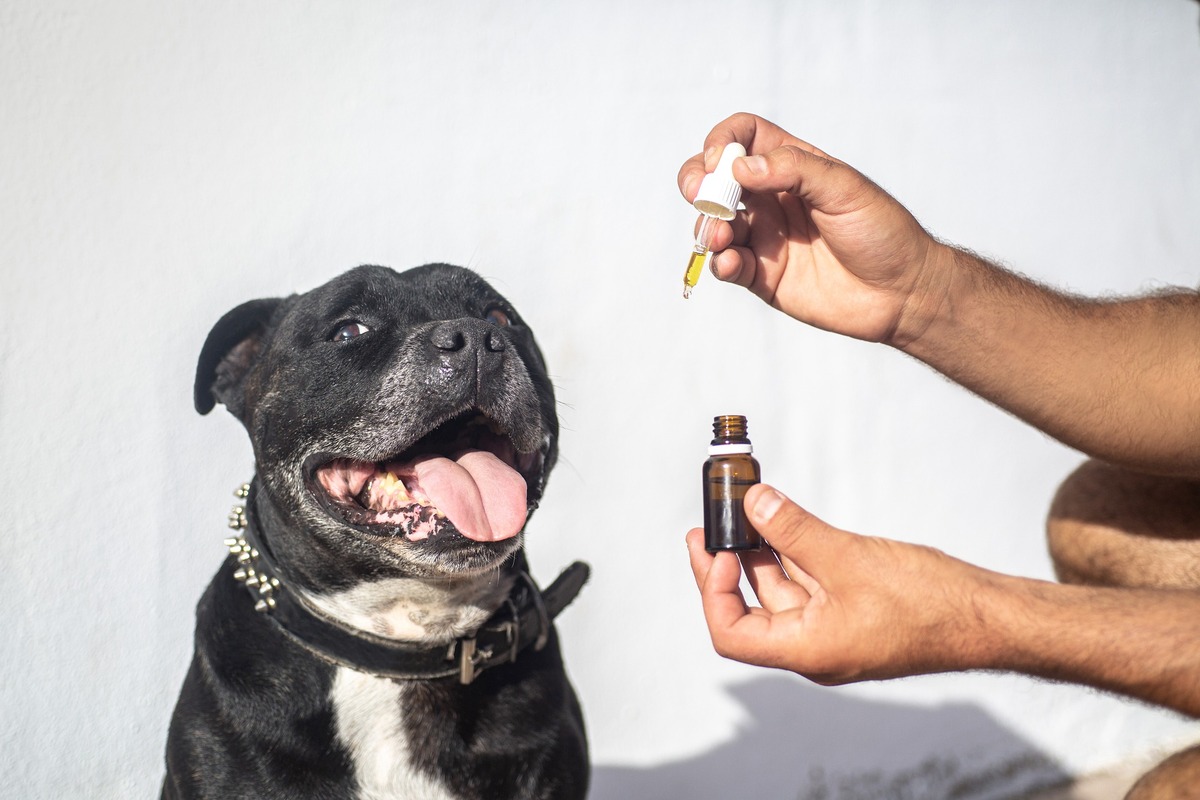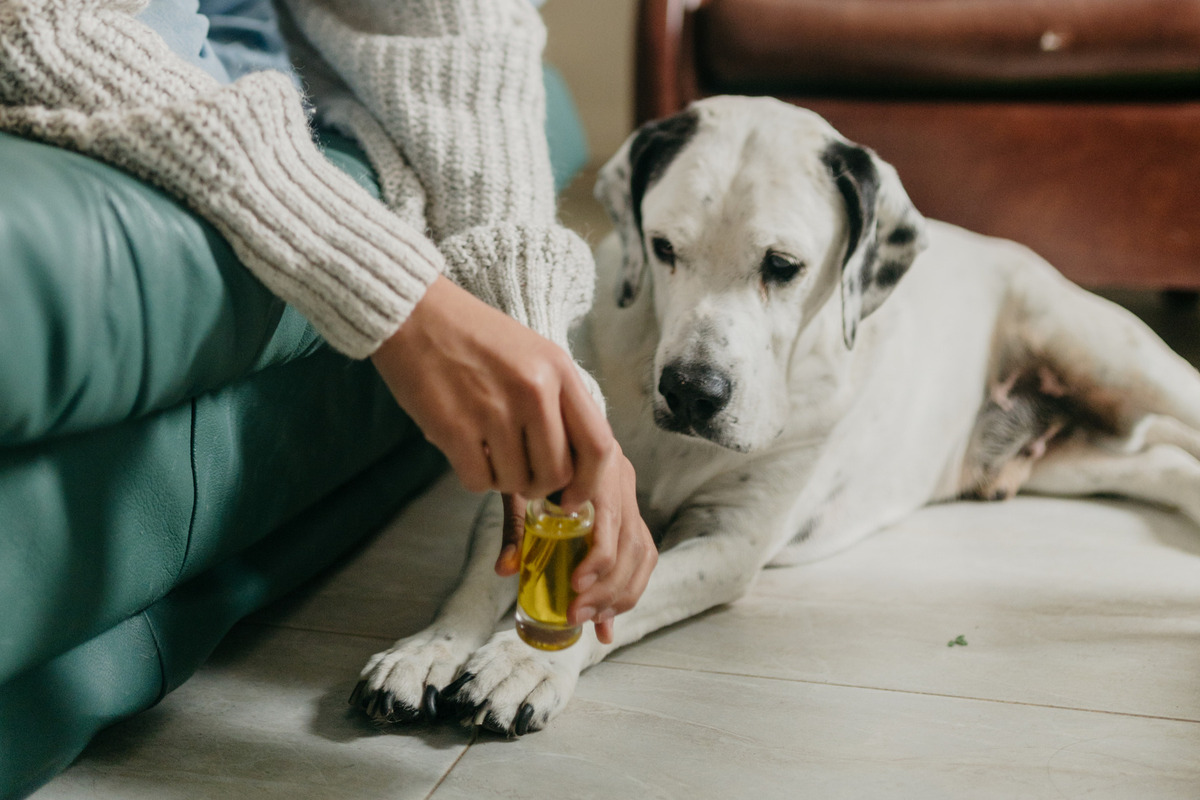Home>Health & Wellness>Common Health Issues>Muscular and Joint Health>What Essential Oils Are Okay For Dogs’ Arthritis Pain


Muscular and Joint Health
What Essential Oils Are Okay For Dogs’ Arthritis Pain
Modified: February 21, 2024
Discover the best essential oils for relieving your dog's arthritis pain and promoting muscular and joint health. Learn how to safely use essential oils for your pet's well-being.
(Many of the links in this article redirect to a specific reviewed product. Your purchase of these products through affiliate links helps to generate commission for Pawsomeoldies.com, at no extra cost. Learn more)
Table of Contents
Introduction
Arthritis is a common health issue that affects not only humans but also our beloved canine companions. As pet owners, witnessing our furry friends struggle with arthritis pain can be heart-wrenching. Fortunately, there are natural remedies that can help alleviate their discomfort, and essential oils have emerged as a popular option for managing arthritis pain in dogs.
In this comprehensive guide, we will delve into the world of essential oils and their potential benefits for dogs with arthritis. From understanding the nature of arthritis in dogs to identifying safe essential oils and learning how to use them effectively, we will explore every aspect to empower pet owners with the knowledge they need to support their canine friends' joint health.
By the end of this article, you will have a deeper understanding of how essential oils can be incorporated into your dog's wellness routine to provide relief from arthritis pain. Let's embark on this enlightening journey to discover the natural wonders of essential oils for our furry companions.
Understanding Arthritis in Dogs
Arthritis, a term derived from the Greek words "arthro," meaning joint, and "itis," meaning inflammation, is a prevalent condition in dogs, particularly as they age. Canine arthritis encompasses a spectrum of joint diseases, with osteoarthritis being the most common form. This degenerative joint disease is characterized by the gradual deterioration of cartilage, the smooth tissue that cushions the ends of bones within a joint. As the cartilage wears away, the bones may rub against each other, leading to pain, inflammation, and stiffness in the affected joint.
The onset of arthritis in dogs can be attributed to various factors, including genetics, obesity, joint trauma, and developmental disorders. Large dog breeds are especially prone to arthritis due to their size and weight, which exert greater pressure on their joints. Additionally, certain breeds may inherit genetic predispositions to joint issues, predisposing them to arthritis later in life.
Recognizing the signs of arthritis in dogs is crucial for early intervention and management. Common symptoms include reluctance to engage in physical activities, limping, difficulty rising from a resting position, and noticeable changes in gait. Moreover, dogs with arthritis may exhibit behavioral changes, such as irritability or withdrawal, as a result of chronic discomfort.
It's important to note that arthritis in dogs is not a reversible condition, but its progression can be managed effectively through a combination of proper veterinary care, weight management, exercise, and in some cases, the use of natural remedies like essential oils. Understanding the nature of arthritis in dogs is the first step toward providing them with the care and support they need to lead comfortable and fulfilling lives.
By gaining insight into the underlying mechanisms of arthritis and its impact on our canine companions, we can approach the management of this condition with empathy, knowledge, and a commitment to enhancing the well-being of our furry friends.
Essential Oils and Their Benefits for Arthritis Pain
Essential oils have garnered attention for their potential to alleviate arthritis pain in dogs. These concentrated plant extracts are renowned for their therapeutic properties, including anti-inflammatory, analgesic, and calming effects. When used thoughtfully and under the guidance of a veterinarian, essential oils can offer a natural and holistic approach to managing arthritis discomfort in dogs.
One of the primary benefits of essential oils lies in their anti-inflammatory properties. Inflammation is a hallmark feature of arthritis, contributing to joint swelling and pain. Certain essential oils, such as frankincense and ginger, exhibit anti-inflammatory properties that can help reduce swelling and discomfort in arthritic joints. By targeting the inflammatory response within the body, these oils may provide relief and improve mobility for dogs struggling with arthritis.
Moreover, essential oils are known for their analgesic effects, which can be particularly beneficial for dogs experiencing arthritis-related pain. Oils like lavender and chamomile possess soothing properties that can help alleviate discomfort and promote relaxation. When applied topically or diffused in the surrounding environment, these oils may help ease the physical and emotional distress associated with arthritis, allowing dogs to experience greater comfort and a sense of calm.
In addition to their anti-inflammatory and analgesic properties, certain essential oils offer holistic benefits that extend beyond physical relief. Aromatherapy, which involves the inhalation of aromatic compounds from essential oils, can have a calming and stress-reducing effect on dogs. This can be especially valuable for dogs with arthritis, as chronic pain and discomfort may lead to heightened stress and anxiety. Oils such as lavender and bergamot are renowned for their calming effects, potentially aiding in the emotional well-being of dogs coping with arthritis.
It's important to emphasize that while essential oils offer promising benefits for managing arthritis pain in dogs, their use should be approached with caution and in consultation with a veterinarian. Not all essential oils are safe for dogs, and proper dilution and administration methods must be observed to ensure the well-being of our furry companions. By understanding the potential benefits of essential oils and their application in supporting dogs with arthritis, pet owners can explore natural and complementary approaches to enhance their pets' quality of life.
Safe Essential Oils for Dogs with Arthritis
When it comes to using essential oils for dogs with arthritis, safety is paramount. Not all essential oils are suitable for canine use, and certain oils can pose risks to dogs, especially when used inappropriately. Therefore, it is essential for pet owners to be well-informed about the safe essential oils that can be beneficial for dogs coping with arthritis.
One of the safest and most widely used essential oils for dogs with arthritis is lavender oil. Known for its calming and soothing properties, lavender oil can help alleviate stress and anxiety in dogs while promoting relaxation. When diluted properly and used in moderation, lavender oil can be applied topically to the skin or diffused in the environment to create a serene atmosphere for arthritic dogs.
Another safe essential oil for dogs with arthritis is frankincense oil. Renowned for its anti-inflammatory properties, frankincense oil may aid in reducing joint inflammation and discomfort in arthritic dogs. When appropriately diluted and administered under veterinary guidance, frankincense oil can be applied to the affected areas or diffused to harness its potential benefits for canine joint health.
Ginger oil is also considered safe for dogs with arthritis when used judiciously. With its anti-inflammatory and warming properties, ginger oil can be beneficial for promoting circulation and easing joint stiffness in arthritic dogs. When diluted and applied with care, ginger oil can be massaged onto the skin or diffused to provide relief for dogs struggling with arthritis-related discomfort.
Additionally, chamomile oil is recognized as a safe option for dogs with arthritis. Its gentle and calming nature makes chamomile oil suitable for soothing achy joints and promoting relaxation in arthritic dogs. Whether applied topically or diffused in the environment, chamomile oil can contribute to a tranquil and comforting experience for dogs dealing with the challenges of arthritis.
It's important to note that the safe use of essential oils for dogs with arthritis hinges on proper dilution, responsible administration, and veterinary consultation. Pet owners should always prioritize the well-being of their canine companions and seek professional guidance to ensure the safe and effective use of essential oils in managing arthritis pain in dogs.
By being mindful of the safe essential oils for dogs with arthritis and approaching their use with diligence and care, pet owners can explore natural and complementary options to support their furry friends' joint health and overall well-being.
How to Use Essential Oils for Dogs' Arthritis Pain
Integrating essential oils into a dog's wellness routine requires thoughtful consideration and responsible application to ensure their safety and efficacy in managing arthritis pain. Here's a comprehensive guide on how to use essential oils for dogs coping with arthritis:
Topical Application:
When using essential oils topically for dogs' arthritis pain, it's crucial to dilute the oils with a carrier oil, such as coconut oil or olive oil, to minimize the risk of skin irritation. The diluted essential oil can then be gently massaged onto the affected joints, allowing for absorption and potential relief from discomfort. Care should be taken to observe the dog's response and to avoid excessive application, ensuring that the oils are applied in a manner that is comfortable and non-invasive for the dog.
Diffusion:
Diffusing essential oils in the dog's environment can create a soothing and calming atmosphere that may help alleviate stress and promote relaxation, which can be particularly beneficial for dogs with arthritis. By using a high-quality diffuser, pet owners can disperse the diluted essential oils throughout the living space, allowing the aromatic compounds to be inhaled by the dog. This method can contribute to a tranquil environment that supports the dog's emotional well-being while potentially providing relief from arthritis-related discomfort.
Massage Therapy:
Incorporating essential oils into massage therapy for dogs with arthritis can offer targeted relief and promote circulation in the affected joints. Diluted essential oils can be gently massaged into the dog's skin, allowing for absorption and potential localized relief. This approach not only facilitates the delivery of the oils' therapeutic properties but also fosters a bonding experience between the pet owner and their canine companion, contributing to the dog's overall well-being.
Consultation with a Veterinarian:
Before embarking on the use of essential oils for a dog's arthritis pain, it is imperative to seek guidance from a veterinarian. A professional assessment can help determine the most suitable essential oils for the dog's specific needs, as well as the appropriate dilution ratios and application methods. Additionally, a veterinarian can provide insights into potential interactions between essential oils and any existing medications or health conditions, ensuring the dog's safety and well-being.
By incorporating these methods and seeking professional guidance, pet owners can harness the potential benefits of essential oils to support their dogs' joint health and alleviate arthritis-related discomfort. It is essential to approach the use of essential oils with mindfulness, responsibility, and a commitment to enhancing the well-being of our beloved canine companions.
Read more: Which Fish Oil Is For Dogs’ Arthritis
Precautions and Considerations
When considering the use of essential oils for managing a dog's arthritis pain, it is essential to prioritize their safety and well-being. While essential oils offer potential benefits, there are important precautions and considerations that pet owners should bear in mind to ensure responsible and effective use.
Veterinary Consultation: Before introducing essential oils into a dog's wellness regimen, consulting a veterinarian is paramount. A professional assessment can provide valuable insights into the most suitable essential oils for the dog's specific needs, ensuring that the chosen oils are safe and appropriate for the dog's individual health status. Additionally, a veterinarian can offer guidance on proper dilution ratios, application methods, and potential interactions with any existing medications, safeguarding the dog's overall well-being.
Dilution and Administration: Proper dilution of essential oils is crucial to prevent skin irritation and adverse reactions in dogs. Diluting essential oils with a carrier oil, such as coconut oil or olive oil, helps mitigate the risk of skin sensitivity and ensures that the oils are applied in a gentle and non-invasive manner. Additionally, responsible administration methods, such as topical application and diffusion, should be employed with mindfulness and moderation to avoid overwhelming the dog with potent aromas or excessive exposure to the oils.
Monitoring for Sensitivity: Every dog is unique, and their response to essential oils can vary. It is important for pet owners to monitor their dog's reaction to the oils closely, particularly during the initial stages of use. Signs of sensitivity, such as excessive licking, restlessness, or respiratory changes, should be promptly addressed, and the use of the oils should be adjusted or discontinued if any adverse reactions are observed.
Avoiding Ingestion: Dogs should never ingest essential oils unless under the direct supervision of a veterinarian. Ingestion of certain essential oils can be toxic to dogs and may lead to adverse effects on their health. Pet owners must store essential oils securely and out of reach of their dogs to prevent accidental ingestion.
Respect Individual Preferences: Just as humans have individual preferences and sensitivities to scents, dogs also have unique responses to aromas. It is important to observe the dog's behavior and comfort level in the presence of essential oils. If the dog displays aversion or discomfort, alternative methods or oils should be considered to ensure a positive and stress-free experience for the dog.
By embracing these precautions and considerations, pet owners can navigate the use of essential oils for managing their dog's arthritis pain with attentiveness and responsibility. Prioritizing the safety and well-being of their canine companions is fundamental in harnessing the potential benefits of essential oils while fostering a supportive and nurturing environment for their furry friends.
Conclusion
In conclusion, the use of essential oils presents a promising avenue for supporting dogs with arthritis, offering natural and complementary approaches to alleviate discomfort and enhance their overall well-being. By understanding the nature of arthritis in dogs and the potential benefits of essential oils, pet owners can empower themselves to provide thoughtful and holistic care for their furry companions.
The journey of exploring essential oils for dogs with arthritis begins with a foundation of knowledge and empathy. Recognizing the signs of arthritis in dogs and acknowledging the impact of this condition on their quality of life allows pet owners to approach the management of arthritis with compassion and insight. Essential oils, with their anti-inflammatory, analgesic, and calming properties, offer a multifaceted approach to addressing the physical and emotional aspects of arthritis in dogs.
Safe essential oils, such as lavender, frankincense, ginger, and chamomile, can be harnessed to provide relief and support for dogs coping with arthritis. When used judiciously and under the guidance of a veterinarian, these oils can contribute to a serene and comforting experience for arthritic dogs, promoting relaxation, reducing inflammation, and potentially improving mobility.
Integrating essential oils into a dog's wellness routine requires mindfulness, responsibility, and a commitment to their safety and well-being. Through topical application, diffusion, and massage therapy, pet owners can create a supportive environment that fosters relief and comfort for their canine companions. Seeking professional guidance from a veterinarian is essential to ensure the safe and effective use of essential oils, considering the dog's individual health status and any potential interactions with existing medications.
In embracing the potential benefits of essential oils for dogs with arthritis, pet owners embark on a journey of holistic care and companionship. By prioritizing the safety and well-being of their furry friends and approaching the use of essential oils with diligence and consideration, pet owners can contribute to enhancing the quality of life for dogs struggling with arthritis.
Ultimately, the integration of essential oils into the care regimen for dogs with arthritis reflects a commitment to providing compassionate and comprehensive support for our beloved canine companions. By leveraging the potential benefits of essential oils in a responsible and informed manner, pet owners can embark on a journey of nurturing and empowering their dogs to lead comfortable, fulfilling lives despite the challenges of arthritis.













